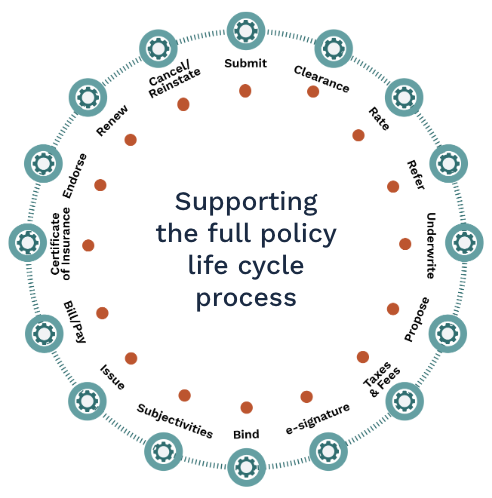The insurance industry has been heavily reliant on legacy data and systems. However, in recent years new technologies have been introduced which will shape the future of insurance. In 2018, we have seen increases in blockchain technology implementation, advancement of artificial intelligence systems, and digitalization of insurance data and infrastructure.
Blockchain and Insurance
Blockchain technology is a decentralized, secured form of shared record-keeping across blocks of information which are “chained” together. While many insurance companies are set in old ways, those who adapt to blockchain technology reap many benefits, specifically in the areas of fraud detection and risk mitigation.
Blockchain’s electronic record system could be used to combat fraud across insurers. Current fraud management systems are costly and ineffective because insurers do not have access to other insurers’ account data. A shared insurance network could help insurers identify fraudulent behaviors more easily. Forbes writes(1) that their respondents to an insurance-focused survey reported that improved techniques for detecting fraud could reduce overall claims costs by 5%. Claims costs for P&C insurers can be massive, and a 5% reduction would have a large impact on profitability.
Additionally, consumers will experience more accurate policies and premiums. CGInsights states(2) that “By allowing policyholders and insurers to track and manage physical assets digitally, blockchain technology can codify business rules and automate claims processing through smart contracts, while providing a permanent audit trail.” In policy administration, there is often a large burden placed on organizations for clerical and manual data entry for compliance with business rules. Blockchain technology helps to codify and automate the retrieval and population of those data points.
Artificial Intelligence and Insurance
Insurance companies of all sizes have inefficient manual processes costing them both time and money. Artificial intelligence (AI) systems mitigate these manual process inefficiencies.
For example, artificial intelligence can be used in insurance for behavioral policy pricing. This new model uses Internet of Things (IoT) sensors to deliver personalized data to insurance calculation platforms to generate quotes based on quality. This is particularly useful for automotive insurance and health insurance when comparing safe drivers to unsafe drivers and healthy people to high-risk populations.
Artificial intelligence insights also impact consumers through improved experiences. Customers can customize coverage for specific items and events through an automated buying experience. Incorporation of AI technology leads to faster claim settlements through AI claims bots which cross-reference claims, run anti-fraud algorithms, approve it, and send wiring instructions to financial institutions in seconds.
Digitalization and Insurance
Digitalization is the process of converting data and infrastructure into digital assets or tools. Both blockchain technology and artificial intelligence are examples of technologies that can be adopted for an insurance organization to go digital. In policy administration, these technologies can have a profound effect on an insurance organization’s profitability. Microservices are another example of digitalization in insurance which can help insurers extend their products to third party technology platforms and to quickly bring to market their new insurance products.
Insurance administration can now be handled on cloud-based platforms like Solartis Insure, policy administration software which is built from the ground up using microservices in a secure, redundant, enterprise-level cloud environment.
Machine learning implementation in a digital platform is useful to accelerate underwriting, product pricing, and claims management. Machine learning along with blockchain technology and artificial intelligence are a robust combination of future technologies that will shape the industry for years to come.
Download the recap of our workshop at Insuretech Connect 2018, covering how modern software architecture can empower traditional insurers and startups.
"They are fast, simple, and cost-effective. Their team is an extremely reasonable group of people who care, really care, about your success. Every launch has some bumps - they worked above and beyond to make sure those bumps didn't disrupt our launch or our ability to write new business. Without Solartis, I wouldn't be projecting a 30% increase in topline growth."
said Cameron Linder, CEO, Western Bowling Proprietors Insurance (WBPI), Rednil Insurance Brokers, Inc.
Future-Proofing Insurance
Technology continues to have its impact on our industry. Blockchain technology, artificial intelligence, and the digitalization of the industry are just a few of the many developments that are set to revolutionize the insurance business.
The implementation of Solartis Insure will provide your organization a cloud-based insurance policy administration solution, built on microservices, that will allow you to take advantage of these exciting new technologies and allow you to expand your offering by selling cutting-edge insurance products in new and creative ways.




